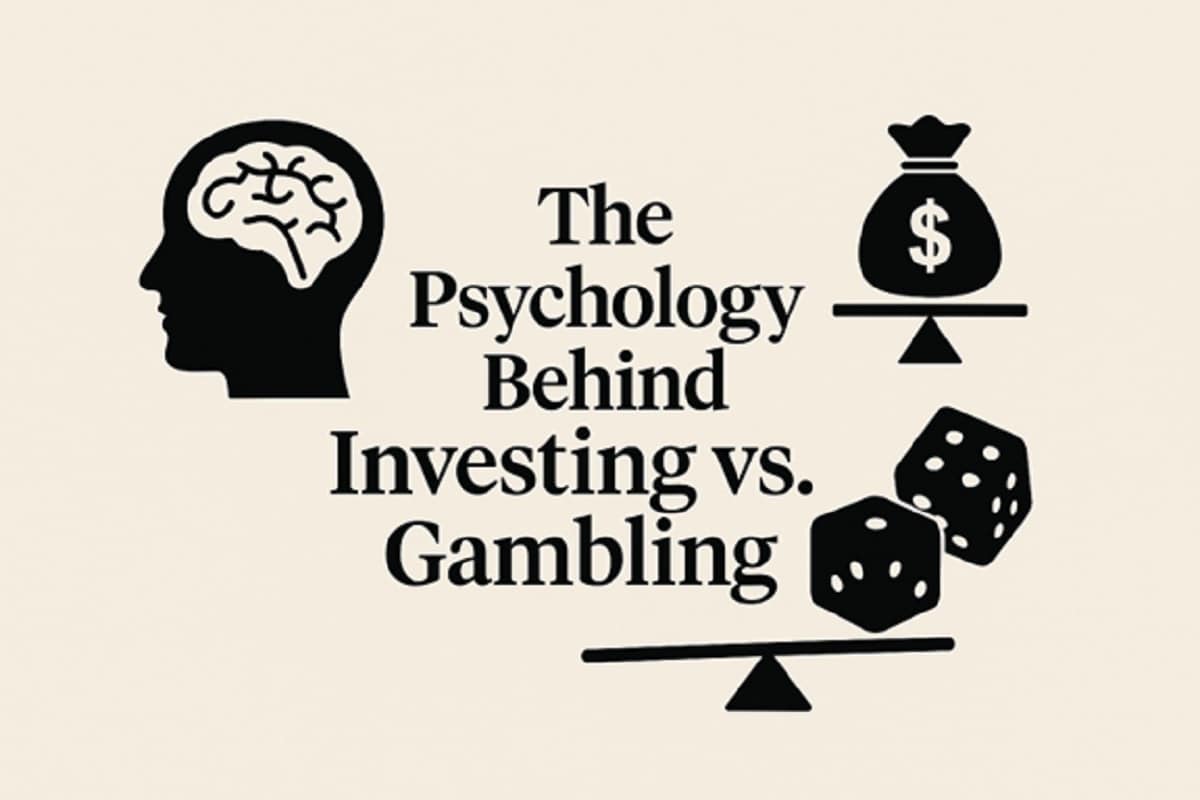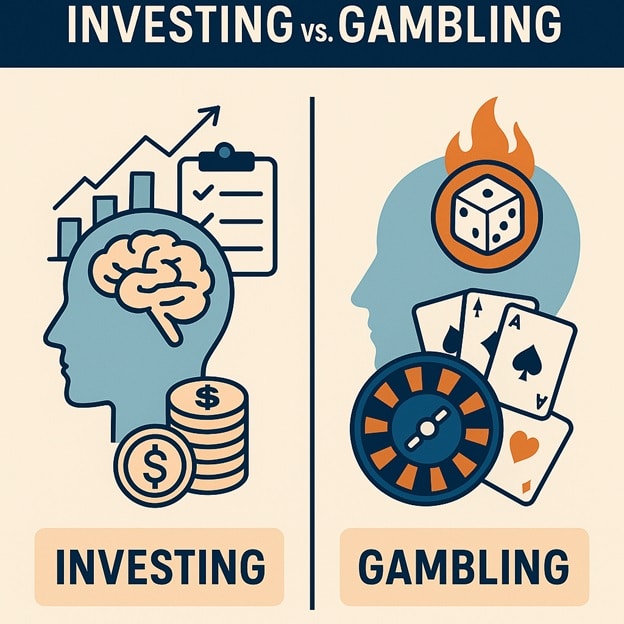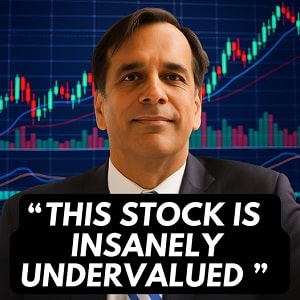The distinction between risk and recklessness remains unclear for many people since they fail to grasp the difference between investing and gambling while developing better financial choices.
The Psychology Behind Investing vs. Gambling: Overview
The distinction between investing and gambling has become unclear in our modern time-sensitive civilization. Risk exists in both activities while winning possibilities exist and substantial financial losses become potential outcomes. People need to understand the psychological fundamentals of both investments and gambling to develop sound financial choices. Investors make their decisions based on examination and research and time they commit to their investments but gamblers follow their emotions and take risks based on luck.
The ability to separate gambling from investing depends on studying external aspects along with mind-based elements such as risk perception and emotional control and cognitive bias effects on financial actions. This article investigates the psychological distinctions between investing and gambling along with explaining why this distinction remains challenging for people and offering methods to prevent mistaking these activities.
Our examination of the mental components alongside techniques and emotional components in both activities will reveal methods for creating better rational choices concerning your money.
Defining the Concepts
Defining investing and gambling stands as a prerequisite for understanding their psychological characteristics since many people mistake their essential differences.
What is Investing?
People invest their resources mostly through money to obtain assets or business opportunities that generate future earnings and increased asset value. The main objective of investment involves developing long-term financial wealth by using analytical research with statistical data to support decision-making.
People who invest base their choices on observing market tendencies as well as assessing company efficiency together with economic data and risk control strategies. The investing approach deals with permanent wealth expansion through various investments while using strategic risk management and diversified investment decisions. The path to wealth accumulation requires time because successful investors focus on building wealth through the process of compound returns.
What is Gambling?
Money or valuable items placed on random outcomes define the gambling activity. Gamblers mostly focus on instant winnings or the feeling of landing large prizes even though they do not care about their money’s future stability.
Gambling success depends mostly on luck rather than any combination of skill together with research or strategic planning. All casino games including poker and roulette and slot machines possess unfair odds that work against the players because results remain mostly uncertain. Strategic elements prevail to some extent in certain gambling activities but luck remains the most influential determining factor. Most people use gambling as an amusement activity rather than a method to increase their finances.
The Core Psychological Differences
Psychological components determine the essential differences between investing and gambling because of how they shape the experiences of each activity. Risk-taking together with potential for rewards and thrill from unknown elements characterize both activities yet the actual psychological methods that govern them differ substantially. The following section will present the fundamental mindset differences between these activities.
Risk Perception
People view risk differently between investing and gambling due to their varying definitions.
- Investing: Risk assessment from investors pertains to a careful determination process. They apply measured systematic methods through assessment of return benefits versus safety risks. Professional investors maintain their growth potential despite risks that exist in every venture because they spread investments across various funds while performing thorough studies and creating lasting business plans. Their investment decisions are based on factual information which they combine with objective data and their strategic thoughts for long-term success instead of short-term variations.
- Gambling: Most gamblers welcome threats in situations where they fail to grasp all risks involved. People in gambling tend to view risk through a lens that presents instant benefits while making choices based on adrenaline more than calculation. People focus primarily on speedy benefits instead of lasting results which causes both judgment impairment and unwise monetary decisions.
Emotional Triggers
The emotional responses to investing and gambling differ substantially even though both activities create intense emotional reactions.
- Investing: Most investors experience both fear and greed as investing emotions which normally remain within moderate levels. Investors who fear losing capital tend to select secure options whereas those consumed by greed face elevated risks to obtain better gains. To succeed as an investor emotional self-control plays a vital role. Long-term investors maintain a detached outlook towards market volatility since they view their strategy as strong enough to succeed over time.
- Gambling: During gambling sessions people make decisions based on their heightened emotions. The excitement of playing games causes gamblers to act on impulse which makes them gamble more aggressively or respond from their emotional peaks. Players tend to develop unrealistic confidence after victories yet they pursue losing bets in order to recover broken in a pattern which makes emotional stability elusive.
Cognitive Biases at Play
Mental distortion affects investments through similar processes that operate during gambling activities. Although these decision-making shortcuts affect judgment, they cause people to choose irrationally.
- Investing: Poorest investment selections emerge from these biases when investors keep losing stocks too long or avoid investments due to fear of potential losses.
- Gambling: The path to addictive gambling behavior includes the tendency to fall prey to biases that include the gambler’s fallacy and confirmation bias. The biases create irrational thinking that triggers dangerous gambling behaviors to worsen.
The Role of Strategy vs. Luck
The main difference separating investing from gambling emerges through how outcomes rely on strategies in investment as opposed to the randomness found in gambling. Risk exists within both activities but individuals take completely different approaches to handle these risks during both gambling and investing.
Investing: A Strategy-Driven Approach
A carefully planned investment strategy determines most investing achievements. Reliance on luck or chance never guides investors since they depend solely on analytical research together with market data and trends to determine investment choices. Investors make their choices among stocks, bonds, real estate along with other investment options according to their long-term objectives and risk readiness and their knowledge of asset time-dependent behaviors.
- Informed Decision-Making: Investors conduct extensive research while evaluating economic indicators based on their market insight to predict market movement patterns. Developing a portfolio which combines execution of risk management against reward potential throughout multiple investment periods becomes the primary goal.
- Patience and Discipline: Investment success usually requires time. Investors typically accept brief stretches of risk to gain substantial long-running growth. Using long-term thinking provides investors with the opportunity to change strategies while learning from market changes which helps them optimize their decisions through the analysis of evolving data.
- Risk Mitigation: Typically investors maintain risk control through investments without any certain expectation of profit or loss potential. Fundamental risk reduction through asset allocation and diversification alongside proper management practices enables investors to minimize their losses and achieve maximum returns. A smart investor understands that managing risks stands equally important to pursuing expansion.
Gambling: Driven by Luck, Often Without Control
The main driving factor in gambling activities stems from luck because it requires no specialized knowledge or abilities to succeed. The majority of gambling activities operate through random chance such as slots or roulette because most games have no element that a person could use to impact results even though poker or blackjack contain strategic gameplay elements.
- Chance-Based Outcomes: Gambling results remain unpredictable for its participants because odds are created before the game begins. Although players can employ strategies, casino managers set the non-alterable odds that dominate the results of every game. With the most effective plan at hand players remain vulnerable to random outcomes.
- Instant Gratification: Unlike investing, where returns take time to materialize, gambling offers immediate feedback. Wins or losses occur rapidly, making it easy for gamblers to become emotionally involved in each round or bet. This fast-paced nature of gambling encourages impulsive decisions, often clouded by the thrill of the moment.
- Limited Control: The main determinant of gambling success for most players is their luck factor. Modern gambling activities produce unpredictable outcomes because players lack any substantial power to control game results even with strategic approaches.
The Illusion of Control in Gambling
Most gamblers experience a psychological dilemma by believing they can impact game results. People who gamble often believe their personal strategies will yield results even though odd makers work against them. Gamblers develop an erroneous belief of control over random games because they pursue wrong notions about skill mastery.
- The Gambler’s Fallacy: People use this cognitive error that trusts historical performances to shape upcoming occurrences. A gambler would believe that a roulette wheel needs to show a particular number although every spin happens separately. People persist gambling despite losing money mainly because they make the wrong assumption about having influence over gambling outcomes.
Behavioral Finance Insights
People use behavioral finance techniques to inspect how emotions affect market movements and individual monetary choices. These external factors have distinct effects on both gambling and investing operations yet their outcomes differ from one another. Knowledge of these psychological elements provides us with an understanding about individuals who mix investing with gambling and shows us how they should improve their financial choices.
The Influence of Cognitive Biases
People use systematic patterns that deviate from rational thinking to form judgments when they draw illogical conclusions about others and situations. Bases in human mental processes cause investors and gamblers to make misguided financial decisions.
- Overconfidence Bias in Investing: When investing people tend to greatly misunderstand their skills at forecasting market trends. Risk-taking investments emerge from overconfidence when investors focus on limited stock or sector choices which results in substantial financial loss when market performance differs from expectations. Overconfidence among investors often leads them to disregard threat factors because they trust their capacity to outperform market predictions.
- Confirmation Bias in Gambling: Gamblers show high vulnerability to confirmation bias because they tend to find or cast information that confirms their existing beliefs. Gamblers tend to deny their previous losses by keeping just their winning experiences in mind so they maintain a dream of success that encourages them to persist gambling against adverse results. The bias prevents gamblers from quitting games because they choose to notice situations that seem to prove their luck theory.
Loss Aversion and the Disposition Effect
- Loss Aversion in Investing: People experience loss emotions intensely when compared to the positive emotions they derive from identical asset values through a mental process known as loss aversion. When loss aversion happens in investing it generates the disposition effect by making investors keep losing investments longer than necessary to wait for recovery instead of selling them to balance their investment portfolio. Investors maintain their positions similarly to gamblers because they neglect significant probability factors that suggest continued betting is disadvantageous.
- Escalation of Commitment in Gambling: A person who starts with financial losses will engage in more gambling as part of their commitment to recover money lost due to the escalation effect. Risk-taking behavior intensifies after someone fails to admit their loss because they fear admitting defeat and later exacerbates their financial damage. The gambler’s growing losses create an internal pressure to pursue the nonexistent winning moment although they clearly have no advantage in the game.
The Endowment Effect
- In Investing: People tend to give higher value to assets they possess because they now have ownership of them according to the endowment effect. Investors maintain ownership of losing stocks for an extended time as they strongly identify with these assets because of ownership. Investors make poor funding choices because they maintain losing stock portfolios instead of releasing them at optimal times.
- In Gambling: Gamblers may form emotional connections to specific betting methods along with casino games although these approaches produce recurring failure outcomes. The endowment effect prevents players from leaving losing propositions because they possess a strong emotional connection to what they bet or believe past bets retain their right to win despite losing.
Mental Accounting and Sunk Cost Fallacy
- Mental Accounting in Investing: The practice known as mental accounting causes individuals to handle money with separate rules based on where it originates or what it will be used for. During investing activities people tend to consider separating the results from each individual investment from their entire financial portfolio so they may make poor choices based on short-term outcomes. Investors may misconceive their stock gains as supplementary funds that lead them to accept avoidable financial dangers instead of integrating them into their long-term financial targets.
- Sunk Cost Fallacy in Gambling: Many gamblers fall into the sunk cost fallacy trap which makes them stay in gambling because of their existing investments yet leaves them at odds with chance. Gamblers underestimate the fact that their lost money cannot be recovered so it should not influence their upcoming choices. Instead of pulling out existing funds from gambling activities gamblers make the mistake of pursuing their lost money which leads to increased risk and worsening financial circumstances.
The Consequences of Blurring the Lines
The failure to differentiate investing from gambling presents serious risks of extreme financial damage combined with serious mental strain to investors. People who fail to identify the distinction between investing and gambling tend to take dangerous approaches which result in substantial financial losses together with emotional suffering and destructive life choices.
Financial Consequences
To yield sustainable financial stability individuals should not expose their money to gambling-like risks during investing.
- Loss of Capital: The practice of investing similarly to gambling leads investors to conduct dangerous speculative trades because they do not grasp market conditions or the fundamental values of their assets. Financial losses amounting to substantial figures occur in this situation. Some investors make flawed financial choices by buying into unidentified hot stocks before researching them properly and by placing entire investment funds into one asset hoping for astounding returns just like reckless gamblers who risk their entire bankroll on a single roll.
- Failure to Build Wealth: People should use investments to create sustained wealth through research-based decision-making and strategic planning for the future. Individuals who consider investing as gambling tend to bypass fundamental procedures such as portfolio diversification and future financial planning. Individuals who gamble with their investments will let down growth possibilities alongside potentially losing large amounts of capital which could be invested more productively for retirement needs and emergencies and additional extended goals.
Psychological Consequences
Experiencing investing as gambling leads to significant mental health problems since both events produce extreme emotional responses.
- Increased Stress and Anxiety: Stress from gambling behaviors tends to affect investment decisions when people develop strong attachment to immediate outcomes. Anxiety caused by this unending emotional state impedes people from setting long-term targets or executing wise choices. People often take dangerous gambles that drive up their feelings of stress because of excessive pressure to succeed in large ways.
- Addiction and Compulsive Behavior: When gambling becomes addictive it generates severe effects than treating investing like gambling does. Because of gambling addiction a player suffers repeated losses through emotions while someone who confuses investment with gambling behaves compulsively by trading assets from fear or greed. The addictive behavior produces both serious financial upheavals and worsening mental well-being.
Strained Relationships
Treatments of investing as gambling produce financial problems which will spill over into the behaviors of the individual and influence their connections with their family members and friends and business associates.
- Trust Issues: Dangerous financial practices frequently destroy relationships because decisions that result in lost shared wealth cause severe harm. The individual’s questionable financial choices can diminish trust between their immediate loved ones who also lose confidence in their ability to make good decisions. Additionally serious financial matters may bring legal complications as well as personal consequences. The actions become particularly harmful whenever dangerous activities threaten the security of combined accounts or family-held assets.
- Strained Personal and Professional Life: Speculative investment pursuit for financial success leads to damaging consequences for a person’s professional career trajectory. A strong need for fast financial gains can disrupt both long-lasting career objectives and secure financial position. The stress selected people experience results in the deterioration of personal relationships and leads them to experience loneliness from isolation and suffer enduring regret.
Regulatory Consequences
Daring financial investments which have an element of gambling might result in regulatory or legal institutions becoming mindful.
- Market Manipulation and Insider Trading: Extreme market manipulators at times attempt to outsmart the system through illegal conduct such as insider trading. Such quick-move financial activities that resemble gambling will lead to severe legal repercussions like monetary fines and imprisonment along with potential legal disputes.
- Loss of Investor Confidence: Similarly reckless investment activities which approach financial markets like casinos strengthen negative public views toward the financial markets. The reckless behavior of many investors causes market transparency to diminish thus discouraging genuine investors to participate which results in economic damage for the entire system.
Practical Strategies to Avoid Mistaking Investing for Gambling
An individual must understand the distinction between investing and gambling to choose wise financial options. Successful investing for the long term demands awareness of how to prevent treating it like a gambling activity. Individuals who implement specific approaches will safeguard both their finances and investment choices by basing decisions on deliberate planning instead of spontaneous actions.
Develop a Long-Term Investment Plan
Investing with a lengthy plan stands as the most reliable method to prevent risky investment conduct. Investing according to a precise strategy which matches your financial commitments alongside your ability to tolerate risk and investment period will protect you from pursuing short-term earnings opportunities.
- Set Clear Goals: Clear definition of financial objectives remains essential to achieve success because it helps guide investments towards retirement savings, children’s education funding and emergency fund creation. Killing distractions like short-term gains and keeping your eye on growth goals becomes easier with clear objectives.
- Diversify Your Portfolio: Diversification of investments represents the best method to decrease investment risks. Distributing your money among different investment asset types such as stocks and bonds and real estate will safeguard your assets from market instability while guarding against unexpected money collapses.
- Stick to a Schedule: Investors who want to develop consistent investment habits should establish a standard contribution plan for building their wealth over time. Dollar-cost averaging provides an investing strategy that shields investors from attempting market timing because it regulates their contributions over time.
Avoid Emotional Decision-Making
The investment process should be conducted with logic however emotional states like worry and greed tend to distort our decision-making ability. Identifying emotional control of your investment decisions provides the opportunity for better focus on your long-term financial objectives.
- Don’t Chase Losses or Profits: Both unsettled investors tend to make risky moves when they try to claw back their financial losses by taking excessive bets or rushing capital out of their positions. Avoid making immediate reactions to passing market fluctuations.
- Take Breaks: Time away from watching your portfolio helps control excessive anxiety when you notice yourself losing peace of mind about your investments. People can preserve their perspective and avoid quick decisions by taking breaks from screen monitoring.
- Avoid Market Timing: Market timing efforts which involve predicting proper buy and sell points are commonly described as gambling activities. Experts have established that market timing leads to successful outcomes only in rare cases. Investors should direct their attention toward the lasting value potential found in their investments.
Educate Yourself About Investing
The difference between investment and gambling depends heavily on a person’s ability to acquire sufficient knowledge to make better decisions. Gambling depends on luck and chance as the main factor yet investing functions through market expertise with industry knowledge and financial theory. Your investment decisions will avoid foolhardy risk-taking behavior when you possess adequate knowledge about investing.
- Learn About Different Investment Options: Research into multiple investment types (stocks bonds mutual funds along with ETFs) will support your better investment choices. Research the benefits versus drawbacks of your investment possibilities before you start your venture.
- Understand the Risks: Each investment venture presents danger to its investors. To manage operational risks effectively investors need to establish methods that include spread investments and knowledge acquisition combined with limit orders. Your knowledge will enable you to make decisions that resist emotional impulses triggered by panic or speculation.
- Stay Informed About Market Trends: Opting for information from news outlets and market trends alongside economic indicators will allow you to base decisions on facts instead of giving in to emotional or rumor-based sentiment. Your financial knowledge expansion will benefit from connecting with financial newsletters along with regularly following decent financial news websites and attending webinars.
Seek Professional Advice
An investment plan evaluation or overcoming emotional investment behavior requires professional financial guidance to achieve clarity.
- Work with a Certified Financial Planner (CFP): Your investment strategy will get professional development with a financial advisor who uses your objectives and pace of risk-taking ability to create personalized solutions. They will assist your investment process to maintain direction during uncertain market times which protects you from taking rash decisions based on fear or greed.
- Avoid “Get Rich Quick” Schemes: Every investor should avoid advisors or investment schemes that offer instant gains without any uncertainty. Such opportunities have more in common with gambling than investing activities. Rely only on expert advice which promotes gradual progress through time while avoiding all speculative gambles for immediate profits.
Set Limits and Know When to Walk Away
All investors must establish investment thresholds which demonstrate when to exit their financial arrangements.
- Establish Stop-Losses: An investment automatically gets sold through stop-loss orders when the price reaches specified levels. Using stop-loss orders helps minimize losses which stops you from developing gambler behavior related to chasing lost funds.
- Limit Exposure to Risky Assets: Safeguard your investments by staying away from risky assets such as speculative stocks along with cryptocurrency if you want to tolerate major loss potential. Allocate only risk-tolerant amounts of funds to your higher-risk investments.
- Know When to Take Profits: You should learn to recognize profitable moments similarly to recognizing loss-taking opportunities because taking profits properly is equally vital to loss mitigation. The desire to accumulate more should not cause you to maintain your successful investments indefinitely without releasing them for the chance of larger profits.
Red Flags – When Investing Becomes Gambling
Although investing differs completely from gambling the mental distinctions between these activities may fade away rapidly. Individual investors accidentally resort to gambling actions when they invest in risky markets like crypto currency or meme stock trades or aggressive daily trading activity. Identifying warning signs stands as the essential measure to safeguard your financial position along with maintaining rational decision habits.
Excessive Day Trading Without a Strategy
Without a strategic investment plan stocks are traded frequently in order to benefit from brief market price swings which resembles gambling.
- Red Flag: Trading based on gut feelings, rumors, or trends rather than research and analysis.
- Why It’s Risky: Without data-driven decisions, outcomes become unpredictable and driven by emotion.
Ignoring Fundamentals
To invest correctly one needs to analyze fundamental-business aspects which include revenue streams and profit margins together with debt levels and competitive market standing. Simple investment in trendy companies without fundamental analysis turns into an uncalculated risk.
- Red Flag: Buying stocks or crypto because “everyone else is doing it.”
- Why It’s Risky: You’re relying on market hype instead of intrinsic value, which often leads to bubbles and crashes.
Overconfidence and Illusion of Control
Fortunately gamblers and investors share a common misconception of believing they will succeed by betting on luck or accrued experience.
- Red Flag: Thinking you’re always right, refusing to admit mistakes, or doubling down on losses.
- Why It’s Risky: Overconfidence can blind you to market reality and prevent you from making adjustments when needed.
Chasing Losses
Investors who encounter trading losses make risky bets to retrieve their initial investments just like gamblers in a desperate attempt to recover their money.
- Red Flag: Refusing to cut losses and investing more into failing assets.
- Why It’s Risky: Emotional decision-making can turn small losses into devastating ones.
Thrill-Seeking Behavior
Investors who encounter trading losses make risky bets to retrieve their initial investments just like gamblers in a desperate attempt to recover their money
- Red Flag: Feeling addicted to the highs and lows of market swings, treating investments like a game.
Why It’s Risky: Investing based on emotion rather than strategy is unsustainable and financially dangerous.
Ignoring Risk Management
Smart investors always weigh risks. Gambles frequently fail to consider these factors in their efforts to attain bigger profits.
- Red Flag: All-in bets on single stocks, options, or crypto without hedging or diversification.
- Why It’s Risky: One wrong move could wipe out your portfolio.
Using Borrowed Money (Leverage) to Invest
The act of financing investment through debt significantly raises risk levels unless accompanied by proper financial reserves and a solid exit strategy.
- Red Flag: Margin trading or taking out loans to chase “once-in-a-lifetime” opportunities.
- Why It’s Risky: Losses are magnified, and you may end up owing more than you invested.
How to Stay on the Investing Side
The transition from investing to gambling behavior should be prevented through disciplined goal-specified thinking. Long-term financial goals should become the primary focus because they will guide your investment decisions toward retirement savings or property purchase or higher education funding. You should invest with a purpose rather than seeking to find excitement.
Thorough research is equally important. Fundamental-based information serves as a foundation for making decisions which leads you to take controlled risks beyond impulsive emotional risks. Your investment capital must extend across different assets so it avoids potential damage from single points of failure. Commitment to long-term thinking enables you to stay calm during market shifts and stops you from making inexperienced choices.
In order to maintain control over emotions it is crucial to use stop-loss orders and maintain portfolio balance and develop written investment plans as these tools limit fear and greed influences. Establishing specific risk boundaries protects your financial comfort since it discourages excessive loss-following tendencies that would normally appear in casino-style gambling.
The last crucial factor requires you to stay away from following the crowd’s decisions. The fact that something experiences market growth does not necessarily indicate it is a practical purchase. Determine whether you would conduct this investment without considering peer involvement.
The path to responsible investment relies on patience as well as extensive planning together with self-awareness. The correct financial mindset combined with a strategic approach lets investors stay safe on their side of investing while preventing financial growth from turning into risky speculation.
Conclusion
The psychological separations between financial investments and betting activities are less pronounced than people typically believe. Wealth creation initially starts in good faith but dangerous behavior might emerge when our actions become controlled by speedy desires or emotional responses or momentary impulses.
The path between investing and gambling can only be avoided by knowing your reasons for investing and accepting your threat capacity while staying updated on your investments. Real investment requires having discipline and being patient through utilizing thoroughly planned methods versus depending on luck and excitement.
Your money along with your mental tranquility will stay untouched through proactive behavior control reinforced with purposeful education and flag recognition. Sound financial principles combined with self-awareness become the ultimate market advantage because they exist above the noise of publicity and randomness. You can identify where you stand between investing and gambling by maintaining the proper mindset although the distinction might sometimes be vague.
FAQ: Investing vs. Gambling
What is the main difference between investing and gambling?
Investing involves allocating resources, typically money, into assets or opportunities with the goal of generating long-term wealth through analytical research, strategic planning, and risk management. Gambling, on the other hand, entails placing money on random outcomes, relying primarily on luck for instant winnings, often without strategic control or long-term focus.
How does risk perception differ between investing and gambling?
Investors assess risks systematically, using data-driven analysis and diversification to balance potential returns against risks, aiming for long-term success. Gamblers often embrace risks impulsively, focusing on immediate rewards and overlooking uncertainties, driven by adrenaline rather than calculated decisions.
What role do emotions play in investing and gambling?
In investing, emotions like fear and greed are moderated through discipline, with successful investors maintaining a long-term perspective to manage market volatility. In gambling, heightened emotions such as excitement or frustration drive impulsive decisions, often leading to aggressive or irrational betting behavior.
How do cognitive biases affect investing and gambling?
Cognitive biases impact both activities but in different ways. In investing, biases like overconfidence or loss aversion can lead to holding losing stocks too long or avoiding opportunities due to fear. In gambling, biases like the gambler’s fallacy or confirmation bias foster irrational beliefs, encouraging risky behavior and persistence despite losses.
Why is strategy important in investing but not in gambling?
Investing relies on informed strategies, including research, market analysis, and risk mitigation, to achieve sustainable growth. Gambling outcomes depend heavily on chance, with limited scope for strategy, as odds are predetermined and results are largely unpredictable, even in games with some strategic elements.
What are the consequences of treating investing like gambling?
Confusing investing with gambling can lead to significant financial losses, failure to build sustainable wealth, increased stress, compulsive trading behavior, strained relationships, and potential legal issues from risky practices like insider trading or market manipulation.
How can I avoid mistaking investing for gambling?
To stay on the investing side, develop a long-term investment plan with clear goals, diversify your portfolio, avoid emotional decision-making, educate yourself about markets, seek professional advice, and set limits like stop-loss orders to manage risks effectively.
What are some red flags that my investing is becoming gambling?
Warning signs include excessive day trading without a strategy, ignoring fundamental analysis, chasing losses, seeking thrills from market swings, neglecting risk management, overconfidence, and using borrowed money for speculative investments.
How can I ensure my investment decisions are rational?
Stay disciplined by focusing on long-term goals, conducting thorough research, diversifying investments, using tools like stop-loss orders, avoiding crowd-driven decisions, and regularly reviewing your strategy to maintain emotional control and alignment with financial objectives.
Why is patience important in investing but not in gambling?
Investing requires patience to allow compound returns and strategic adjustments to yield long-term growth. Gambling seeks instant gratification, with outcomes resolved quickly, making patience irrelevant as results depend on immediate, luck-based events.


































